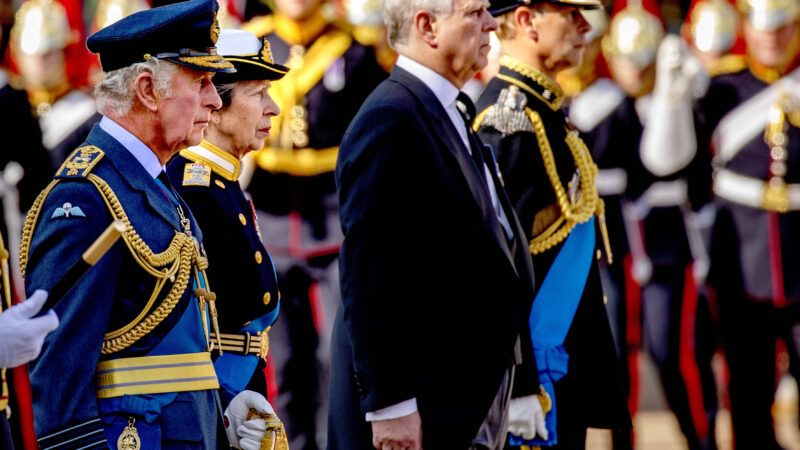British Cops Arrest and Threaten Anti-Monarchist Protesters
Anti-royalists are facing fines and jail sentences for disrupting ceremonial events

As the United Kingdom mourns the death of Queen Elizabeth II, some anti-monarchist protesters and activists have found themselves facing scrutiny from British police over their public displays of dissent.
A Scottish man was arrested on Tuesday after he allegedly yelled at Prince Andrew as the duke of York accompanied the queen's funeral procession through the streets of Edinburgh. "Andrew, you're a sick old man," a man can be heard shouting in a video obtained by The Independent, likely in reference to allegations against the duke of sexual misconduct with underage girls. That arrest comes just two days after a Scottish woman was detained after she displayed a sign that read ''fuck imperialism, abolish monarchy" at a ceremony proclaiming King Charles III as the monarch.
These police actions against anti-monarchists have not been limited to Scotland either. Peace activist Symon Hill claimed he was briefly detained, but later released by police, after shouting "Who elected him?" at a similar proclamation ceremony for the new king in England. Paul Powlesland, a British lawyer, said he held up a blank sheet of paper in London's Parliament Square and was questioned by police, who reportedly told him not to write any anti-monarchist messages on the signs out of fear that "someone might be offended."
U.K. law authorizes police action against protests and grants officers wide discretion to act in service of public order. Back in April, a new policing law took effect, allowing police officers in England and Wales to shut down protests if they deem them to be too "noisy" or "disruptive," even if those protests are nonviolent. This law immediately prompted outrage from civil liberties groups in the U.K., as well as Parliament's Joint Committee on Human Rights, which argued the law has created a "chilling effect" on speech in a recent report. It also comes after new legislation passed in the U.K. that some say has curtailed British citizens' free speech and privacy rights in online forums and on social media under the guise of "internet safety."
The enforcement of those laws has taken on an even higher profile as the death of Queen Elizabeth II reignites debates in the U.K. over the future of the monarchy and the country's political system. Though the queen enjoyed consistently high popularity, King Charles III has not seen that same level of support from his new subjects. A poll taken ahead of the queen's Platinum Jubilee in June found that just 42 percent of Britons had a favorable view of Charles. While the king has seen a bump in popularity in the aftermath of his mother's death, some wonder how long it will last, especially amid several gaffes during the ascension process. Some Commonwealth countries, notably Jamaica, have already openly proposed removing the British monarch as their heads of state.
The juxtaposition of these law enforcement actions against protesters and the uncertainty amid the country's monarchical transition has been jarring for many Britons, especially opponents of the monarchy. It goes without saying that arresting protesters for criticizing the unelected head of state flies in the face of free speech rights, especially since Britain's constitutional structure allows for criticism of the crown.
Libertarians have also voiced concerns that the monarchy may no longer maintain the same neutrality and restraint as part of the political zeitgeist under Charles. With these arrests, the urgency behind those fears and worries has only increased, as some now see the enforcement of these laws as an unreasonable limitation of Britons' free expression and an omen of the changing relationship between the crown and its subjects.
"A period of quiet mourning for the Queen is fine," Powlesland tweeted. "But using that period to cement Charles [sic] Accession as King & cracking down on any dissent to the accession as disrespectful is outrageous."


Show Comments (45)